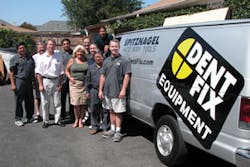Our goal is to sell one really good product to one guy in every shop, because we know everyone else will want one, too,” states Erik Spitznagel in describing the snowball effect that has brought Spitznagel Auto Body Tools and Dent Fix Equipment from humble beginnings to an established position in the collision repair arena.
The company’s origins come from transformer manufacturing in Germany. It’s there that company founder Max Spitznagel, along with his brother Rudolph, developed the idea for manufacturing a stud welder. The product sold very well in Europe, which prompted Max to test it in U.S. waters. Working as a mechanic in Southern California, he began selling them from his repair shop in 1978.
“As a kid I always went to the shows with my dad. So I picked up on some of the best ways to sell our products at an early age. Besides, everyone wanted to give the ‘kid’ an order,” recalls Spitznagel with a smile.
To clarify, Dent Fix Equipment is the umbrella corporation that markets several lines of product. Spitznagel Auto Body Tools references items like their stud welders, spot weld drills, tram gauges, air tools and other products often designed by Max Spitznagel. Other lines of equipment include tools from Bendel Werkzeuge and Car Tools, brother companies based in Germany and Asia.
As both the company and Erik Spitznagel began to mature, he started to disperse more of the operational tasks in order to focus on selling and expanding the company’s offerings. The result was a couple of consecutive years with 20+ percent growth, which was helped by increased distribution, improved product availability and a greater awareness of the company and everything it brought to the industry. With the increased demand and more visible warehouse distribution, products were easier to buy and fewer sales opportunities were missed.
Cutting The Hassle
“I’m always trying to learn from my customers,” states Spitznagel. “Which means we have to treat them right in order to receive referrals, new product ideas or insight on how to improve our current products.” A couple of programs that Dent Fix uses to drive their customer service approach include on-site repair and one-year warranties.
“What we’ve found is that our customers are more loyal to us because they know we’re listening to them and taking steps to improve, and provide what they need,” explains Spitznagel. “They end up liking to do business with us because they’re satisfied with our products and services and they know they won’t get hassled. All of these things combine to provide great word-of-mouth exposure.”
Making It Easier
The company’s motto states; “Equipment designed to complete the job faster, more efficiently and with a higher quality result.” In order to accomplish these goals, there’s an onus on developing new products at a regular pace. “And, again, that’s where the relationship we have with our customers is so important,” states Spitznagel.
While it’s rare that reactive processes are spotlighted, this company’s reactions to customer suggestions and changes in the market have fueled a number of new products. Spitznagel states that the company’s presence at shows like Automechanika and NACE have provided a great starting point for numerous tool ideas.
“We’ll have people come up to the booth and ask if we have anything for a particular vehicle make or repair problem. That’s one of the things that got us working on a new set of aluminum body tools,” he states. The company is also contacted on a regular basis by inventors from around the world.
“We’ll usually get around 10 ideas, then we’ll pick three or four to develop more deeply. We have to be careful because we don’t want to sell everything,” explains Spitznagel. “Part of our success comes from staying focused on tools and equipment that help save time or make a job easier. Our distributor customers thrive on efficiency-driven products that help increase a shop’s profitability.”
The company’s offerings entail nearly 100 products for measuring, drilling, pulling or preparing a vehicle for collision repair. “We’re really an instant PBE store, which is why we place a flier in every order. Distributors don’t always realize how much we have to offer.
"Our #1 seller has been the spot weld drill for quite a while, but we carry a broad range of body shop equipment. More importantly, however, is the role we embrace as a consultant in helping the seller to better understand the body shop, and our product’s place within them,” states Spitznagel.
Spitznagel says he can appreciate the difficulties that some distributors have in servicing body shops. “That’s why we’re always happy to talk with them,” he explains. “We’re ready to share our knowledge of the body shop and how to best serve this customer base. Sometimes that means actually referring them to products from other companies. The ultimate goal is to let them know that we’re here for them with products, service and advice. I’ll often tell a distributor customer to be open with the body shop. Tell them if you don’t know, but that you’ll find out. Then call us.”
Looking forward, Spitznagel says the company should continue to grow, with changes in vehicle repair technology driving the need for new products. As they do, Dent Fix Equipment and Spitznagel Auto Body Tools will work to provide the right product mix, a high level of service and a helping hand in meeting this market’s needs.
Body Of Work
Erik Spitznagel sees the following trends having a significant impact on body shop purchases:
- “The popularity of hybrid vehicles could hurt independent shops, as the dealership body shops have greater resources in fixing these vehicles right now.
- “Aluminum repair systems, like the one we have developed, are becoming vital to a body shop’s survival. This is part of the new specialization in vehicle repair. Some manufacturers will not even sell replacement parts to shops that are not certified in aluminum repair.
- “With the changes in vehicle technology, shops will have to spend more on tools and equipment to stay in business.
- “Body shop technicians are more highly trained than ever before because they have to be able to service a wider range of vehicles that are more complicated. This leads to a greater need for additional tools and equipment. Their profitability depends on it.”


